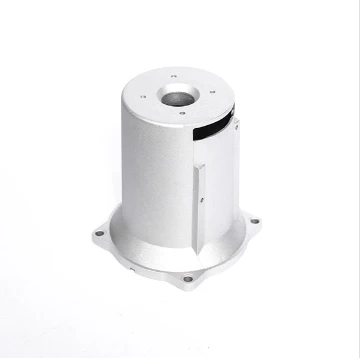Mobile:+86-311-808-126-83
Email:info@ydcastings.com
English
Feb . 16, 2025 15:23
Back to list
irrigation pump impeller
Unlocking the Efficiency of Irrigation Pumps The Pivotal Role of the Impeller
Moreover, advancements in technology have introduced impeller variations that focus on energy efficiency. Modern impellers are often designed with computational fluid dynamics to model and enhance water flow under various operating conditions. These state-of-the-art designs aim to reduce energy consumption, directly addressing the global push toward sustainable and environmentally friendly agricultural practices. In practice, sharing real-world experiences from professionals who work daily with irrigation systems provides invaluable insights into the role of impellers. Many experts have witnessed firsthand how opting for the right impeller type can drastically reduce operational costs and improve water distribution. These testimonials underscore a broader industry consensus while impellers may represent just one part of the complex irrigation machinery, their impact is disproportionately large in ensuring overall system efficiency. From an expertise standpoint, it's crucial to recognize that not all impellers or pumps are created equal. Choosing the appropriate impeller involves a comprehensive understanding of the irrigation requirements, including water source characteristics, pressure needs, and crop types. Consulting with irrigation specialists or pump manufacturers can aid significantly in making informed decisions, enhancing both the financial and operational aspects of agricultural and landscaping activities. Authority in discussing impeller selection and pump maintenance cannot be overstated. As water conservation efforts intensify, backed by stringent regulations in many regions, agricultural operators face increased pressure to refine their irrigation strategies. Organizations and governing bodies often recommend or mandate the use of specific impeller designs or materials to meet regulatory standards, placing due importance on compliance to ensure both operational and environmental benefits. In fostering trust, it is vital to acknowledge the collaborative efforts of manufacturers, agricultural engineers, and environmental scientists. These stakeholders jointly contribute to continual improvements in irrigation technology and impeller innovation. Regular, transparent updates on emerging technologies, alongside established practices, reinforce trust and reliability among end-users. Finally, the focus must remain steadfast on the holistic role of the impeller within the irrigation pump system. As trends lean towards automation and smart irrigation solutions, the integration of evolutions in impeller design with these advanced systems will reshape the landscape of agricultural efficiency. Equipping operators with knowledge and access to the latest innovations ensures sustainable, prosperous outcomes for generations to come.


Moreover, advancements in technology have introduced impeller variations that focus on energy efficiency. Modern impellers are often designed with computational fluid dynamics to model and enhance water flow under various operating conditions. These state-of-the-art designs aim to reduce energy consumption, directly addressing the global push toward sustainable and environmentally friendly agricultural practices. In practice, sharing real-world experiences from professionals who work daily with irrigation systems provides invaluable insights into the role of impellers. Many experts have witnessed firsthand how opting for the right impeller type can drastically reduce operational costs and improve water distribution. These testimonials underscore a broader industry consensus while impellers may represent just one part of the complex irrigation machinery, their impact is disproportionately large in ensuring overall system efficiency. From an expertise standpoint, it's crucial to recognize that not all impellers or pumps are created equal. Choosing the appropriate impeller involves a comprehensive understanding of the irrigation requirements, including water source characteristics, pressure needs, and crop types. Consulting with irrigation specialists or pump manufacturers can aid significantly in making informed decisions, enhancing both the financial and operational aspects of agricultural and landscaping activities. Authority in discussing impeller selection and pump maintenance cannot be overstated. As water conservation efforts intensify, backed by stringent regulations in many regions, agricultural operators face increased pressure to refine their irrigation strategies. Organizations and governing bodies often recommend or mandate the use of specific impeller designs or materials to meet regulatory standards, placing due importance on compliance to ensure both operational and environmental benefits. In fostering trust, it is vital to acknowledge the collaborative efforts of manufacturers, agricultural engineers, and environmental scientists. These stakeholders jointly contribute to continual improvements in irrigation technology and impeller innovation. Regular, transparent updates on emerging technologies, alongside established practices, reinforce trust and reliability among end-users. Finally, the focus must remain steadfast on the holistic role of the impeller within the irrigation pump system. As trends lean towards automation and smart irrigation solutions, the integration of evolutions in impeller design with these advanced systems will reshape the landscape of agricultural efficiency. Equipping operators with knowledge and access to the latest innovations ensures sustainable, prosperous outcomes for generations to come.
Latest news
-
Materials Used in Manufacturing Cap End Pipe FittingsNewsNov.24,2025
-
Material Properties of CF8M CastingNewsNov.24,2025
-
How to Inspect Pump Cap Ends for DamageNewsNov.21,2025
-
Backward Curved Impeller – Efficient Airflow Solutions for Industry | YD CastingsNewsNov.21,2025
-
Automobile Water Pump - Efficient, Quiet, Durable & ElectricNewsNov.21,2025
-
Impeller for Pumps – High-Efficiency, Durable, OEM-ReadyNewsNov.21,2025
Related PRODUCTS











